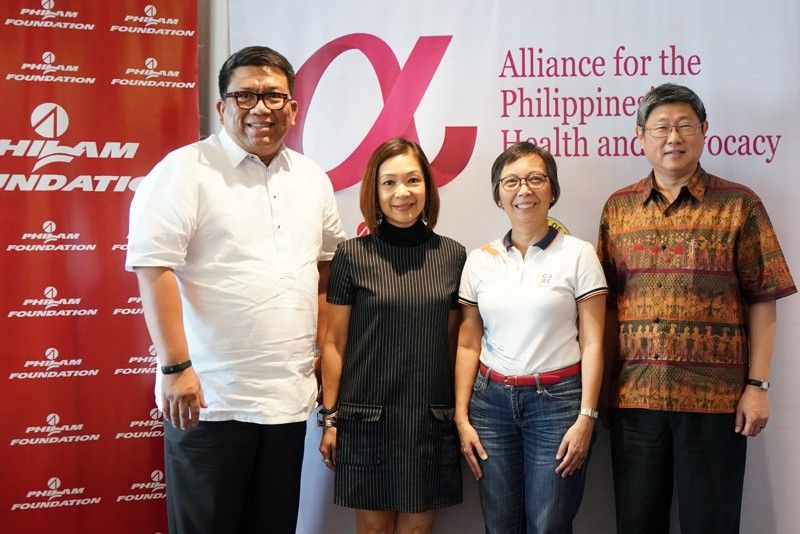Cancer registry to help guide policy, help patients


Philam Foundation and CARE Philippines create an app for national cancer data collection.
The Big C still figures as the primary cause of morbidity and mortality in the country, with breast cancer as the leading cancer scourge among Filipinos.
Given this data, the need for a reliable cancer registry is more palpable now more than ever simply because timely and accurate cancer statistics “are crucial to identify priorities for cancer-control strategies at the national level.”
This was announced by Dr. Beatrice “Trixie” Tiangco, Cancer Registry Philippines (CARE) president and CEO, during the launch of the app expansion of a hospital-based cancer registry program at The Tower Club in Makati City.
The launch was spearheaded by Philam Foundation, the CSR arm of Philam Life. This is a joint partnership with the Alliance for the Philippines’ Health and Advocacy (ALPHA), in partnership with Cancer Registry Philippines (CARE), a hospital-based cancer registry system.
“Hospital-based registries are important tools for region-specific data creation, as well as policy formulation, with emphasis on the development of effective screening programs,” Dr. Tiangco explains. “The vision of CARE Philippines is to provide better healthcare for all Filipino cancer patients. Our mission is for every preventable cancer prevented, every screenable cancer to be detected and very cancer patient counted.”
What’s app, doc?
CARE Philippines created the cancer registry app, which can enter data in real time and can document treatment and measure outcomes.
“The app is free, but minimum maintenance fees may apply. That’s also the reason why we partnered with Philam Foundation’s ALPHA, which is funding this project,” enthused Dr. Tiangco. “Let me reiterate that ALPHA does not own the data gathered.”
According to Philam Foundation president Max Ventura, the foundation doesn’t gain anything from the partnership financially.
“And the reason why we readily agreed to this agreement — where we don’t really have access to the data but rather it’s publicly disclosed — is our desire that this cancer registry be a vehicle for medical researchers to do something about the data and give them free access,” explains Ventura. “Hopefully that encourages more researches about cancer and ethnological studies. We also feel it suits the advocacy of ALPHA where we really want Filipinos to live healthier and longer through our programs.”
The objective of the app is to collect and analyze data of Filipinos who have cancer from various hospitals. The data will be aggregated and analyzed and will serve as a key driver for more research, which will influence patient care, public health policies, etc.
Be counted
In 2017, Philam Foundation signed an agreement to establish ALPHA and the partnership of ALPHA with CARE Philippines.
“Together, we tried to work on having that hospital-baed cancer registry up and running,” shares Max Ventura, president of Philam Foundation.
Two population-based cancer registries — the Philippine Cancer Society-Manila Cancer Registry and the Department of Health-Rizal Cancer Registry — have been the main sources of cancer incidence data in the country for more than 30 years.
“By the end of 2018, we had about 20 hospitals as members in the registry with 10 hospitals sharing data on over 5,700 cancer registrants,” adds Ventura.
In this hospital-based database, breast cancer is followed by colorectal and head and neck, cervical, prostate and lung cancers in decreasing rank of incidence, as compared to Global Cancer Network’s (Globocan) 2018 data, which puts lung, colon and liver cancers on top of the list after breast cancer.
The first year results also showed that the other most common areas where cancer grows include the thyroid, uterus, kidney and in the blood, which includes leukemia, lymphoma and myeloma.
“Globocan publishes cancer incidence not just in the world, but in individual countries like the Philippines. The most recent available data on cancer from Globocan reveals that there were an estimated 141,021 new cases of cancer in the Philippines in 2018. This year, 141,000 people are expected to be diagnosed with cancer this year. A total of 86,337 are expected to die this year. The prevalence, meaning those who are newly diagnosed and those who had cancer for the past years (which totaled 291,000 people), are still alive,” noted Dr. Tiangco.
Through the passage of the National Integrated Cancer Law (RA 11215), all clinics and hospitals are now mandated to have their own cancer registry to serve as the crucial source of data for a population-based national cancer registry.
CARE Philippines is solely responsible for the security of the anonymized data with a secure and encrypted Care central database accessible only by Care executives Beatrice Tango and Ric Parma.
All patients are informed that the hospital maintains a cancer registry database that contains personal information about those diagnosed with and/or treated for cancer within the hospital. These patients are also given the opportunity to opt out of the database, and to agree or disagree to being called by the Cancer Registry office once every six or more months up to five years from their diagnosis.
“One of the gaps in the health sector is the need for a cancer registry due to lack of data,” Ventura noted. “Thankfully, we came across CARE Philippines.”
Dr. Kenneth Hartigan Go of the Philippine College of Physicians also gave his two cents on the importance of the cancer registry.
“In the scheme of things in global health, it’s too important to leave it only to the government to manage this condition. But through this cancer registry, we’ve shown a beautiful model where a private sector and the cooperation of medical practitioners in the country can lead in some form of innovation using technology, ”says Dr. Go.
According to the amiable doctor, the registry provides quite a number of advantages.
“For one, it can help change evidence-based policy making by knowing what kind of cancers and malignancies are available and if the patients are getting the right care they need. And that will guide the people making the rules and regulations as to where to allocate budget to deal with the problems. Second, it encourages academicians, scientists and clinicians to participate in cancer research. And what better way to do this than to get our own data from the registry,” Dr. Go explains. “The Philippine College of Physicians is honored to partner with CARE and Philam Foundation.”
In a statement, Philam Foundation chairman Aibee Cantos shared: “Our hope is that we get a clearer picture of the cancer situation in the country and help the Filipino cancer patient in their journey, as well as contribute to cancer control and prevention.”
With RA 11215 or the National Integrated Cancer Law, CARE Philippines will work with the Department of Health and other stakeholders in creating and maintaining a population-based cancer registry system.
* * *
For inquiries, visit www.cancerregistryph.com/careph.



















